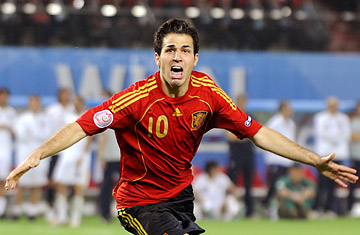
Spanish midfielder Cesc Fabregas celebrates after scoring the winning goal on Sunday.
As the minutes wound down in regulation time of the Italy-Spain quarter-final, a fear crept into the hearts of most neutral observers: Good God, this match is not going to end. It didn't need a goal, it needed a mercy killing. But as Spain discovered in its difficult — and difficult to watch — 4-2 penalty kick shootout win in the quarter-finals of Euro 2008, trying to get past an Italian team committed to a defensive scheme is like playing in ski boots filled with linguini carbonara. The pace slows. Every passing lane seems clogged, and there are more defenders in the penalty area than pawns on a chess board.
Italy wasn't the only quarter final contestant to try to destroy its opponent's tactical advantage, merely the only unsuccessful one. Russia, Germany and, again in spectacular fashion, Turkey, provided delicious upsets of Holland (1-3 after extra time), Portugal (2-3) and Croatia (1-1 after extra time, 3-1 on penalties) to disrupt a tournament that had already been set alight by Turkey's last gasp heroics against Switzerland and the Czech Republic.
Gritty, dogged Italy advanced to the quarters by somehow avoiding a loss to Romania and beating a French team that is fading faster than its own side. Against high-scoring Spain, and lacking its midfield virtuoso Andrea Pirlo, Italy opted for its classic catennacio defense, and Spain suffered the consequences. Italy's interest in attack was episodic, and with the helpless Luca Toni leading its offense, Italy registered its first corner kick 40 minutes into the game.
This was grim stuff indeed. The flowing Spanish football that had destroyed Russia, undid Sweden and overcame Greece with its second team was the last thing Italy needed to see. So the Italians shunted the Spanish to the outside and shut down anything coming up the middle. They so frustrated the normally dynamic Andrés Iniesta that he was pulled in the 59th minute along with his running mate Xavi Hernández. Yet it was Italy who got closest on the hour, when Spain keeper Iker Casillas made a left footed save on substitute Mauro Camoranesi after a goal mouth scramble.
After a feckless overtime, the two teams squared off for penalties, and Spanish keeper Iker Casillas made great stops on Daniele De Rossi and Antonio Di Natale to claim the victory. "To be honest I think we deserved it," noted Casillas. To be honest, Iker, we didn't deserve to have to watch this mess.
The rest of the semi-final draw belongs to the underdogs. The Russians pulled off the upset of the tournament — which is saying something given Turkey's incredible win over Croatia — by beating the Dutch at their own game in a stunning 3-1 win in extra time. "What the boys did in their commitment, what they did to outplay tactically, physically the Dutch team. It's almost a miracle," said Russian coach, the Dutchman "Lucky" Guus Hiddink. What the Russians did is learn and adapt in the course of a long tournament. In their first game, against Spain, the Russian back line played too far up the field and got torched by the Spanish front of Fernando Torres and David Villa. They weren't going to make that mistake against the speedy Dutch, and kept two defenders deep, never allowing the Netherlands to stretch the game as they had done so successfully.
More importantly, the Russians believed they could attack too, particularly against a team with a one-striker system as the Dutch employ. The Russians are not plodders. It's a team of whippets: thin, very fit and athletic. Against Greece, left wing fullback Yuri Zhirkov repeatedly attacked up the flank and poured cross after cross toward the tall striker Roman Pavlyuchenko.
Against Holland, Pavlyuchenko had help in the baby faced striker Andrei Arshavin, who gave the Dutch defense all they could handle. Pavlyuchenko was the first to a cross by Sergei Semak in the 56th minute, and it looked a certainty that the Russians could make the goal stand up, despite the addition of Robin van Persie and Ibrahim Afellay to the game for Holland, Arjen Robben being unavailable. Finally, Ruud van Nistelrooy converted a free kick with a far-post header to level the game in the 86th minute. Yet the Russians held together and then took charge in overtime. "The most important thing is our movement," noted Pavlyuchenko. "Hiddink said that if we kept going, the Dutch would be worn out sooner or later. I have no idea where our energy came from. We were very good going forward — the attack was supported not by one, but by three or four people." That continued in the overtime, when Russian sub Dmitri Torbinski, a wisp of a man who had tortured the Greeks in the previous game, squeezed Arshavin's cross in at the far post in the 112th minute. Arshavin nailed the Dutch coffin shut with a deflected goal four minutes later.